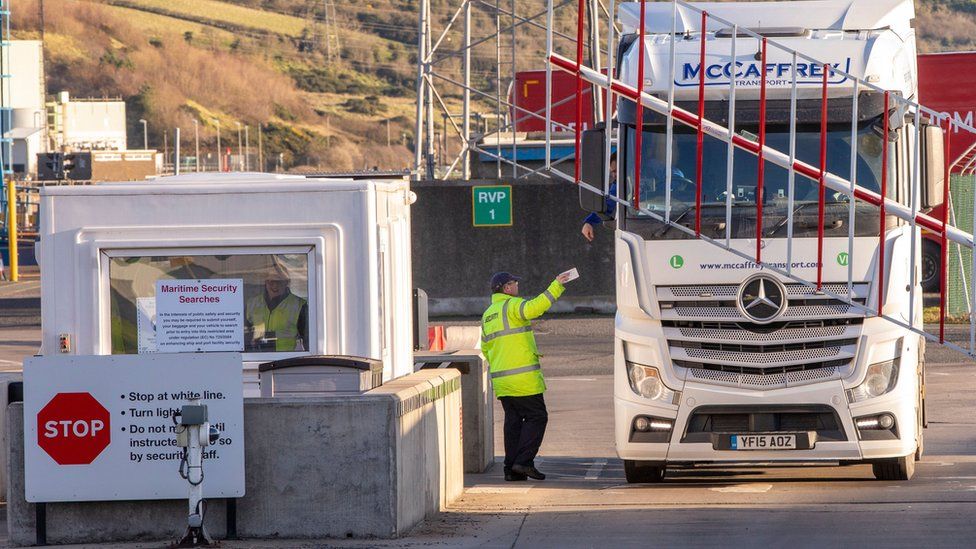
By John Campbell
BBC News NI economics and business editor
The UK government has published new details about how the Windsor Framework will operate in practice.
The framework is intended to ease post-Brexit trade between Northern Ireland and the rest of the UK.
Implementation is due to start in October and some business groups have expressed concerns about a lack of operational detail.
The new guidance covers the movement of food products and labelling of medicines.
It also covers a trusted trader scheme for food retailers.
The framework modifies the Northern Ireland Protocol, the 2019 UK-EU deal which kept Northern Ireland inside the EU’s single market for goods.
That arrangement keeps the Irish land border open but has meant products arriving into Northern Ireland from the rest of the UK are subject to checks and controls.
The new deal is aimed at reducing the frictions on Great Britain to Northern Ireland trade, primarily by expanding a trusted trader scheme and introducing a system of green lanes and red lanes at Northern Ireland ports.
Products which are due to stay in Northern Ireland will be processed through the green lane meaning they are subject to minimal checks and controls.
The framework also means food products which are produced to UK rather than EU standards can continue to be sold in Northern Ireland and will need minimal paperwork to be moved from Great Britain.
The flipside of this is the introduction of ‘Not for EU’ labels on food products sold in Northern Ireland.
Image source, Getty Images
The House of Lords NI Protocol Committee has asked for clarification on some aspects of new food labelling requirements
From October, prepacked meat and fresh milk have to be individually labelled in that way, with labelling of other goods being rolled out by July 2025.
The trusted trader scheme, the NI Retail Movement Scheme (NIRMS) will open for registrations on 1 September.
The guidance explains that for the scheme to work the business sending the consignment in Great Britain and the business receiving the consignment in Northern Ireland both need to be registered for the scheme.
The NIRMS will replace the Scheme for Temporary Agri-food Movements to Northern Ireland, known as STAMNI, which is mainly used by the major supermarkets.
The government said it will “work with operators to ensure that existing STAMNI traders are not subject to disruption in their goods movements as they transition their membership across to the new scheme”.
It added that during the first few months of the new scheme, procedures will be in place to “ensure that existing STAMNI traders will benefit from the new Green Lane”.
Image source, Getty Images
The new guidance has more details about ‘groupage’ freight
The guidance also attempts to clarify how ‘groupage’ freight will be treated.
Groupage is when goods dispatched by several different companies are grouped together into the same lorry load.
The guidance confirms that if a grouped load contains a mix of NIRMS compliant goods and consignments which are not eligible for the NIRMS, the lorry as a whole cannot benefit from all the facilitations under the NIRMS.
However, it adds that those NIRMS compliant parts of a mixed load can still be moved used a simplified certificate rather than requiring veterinary signed health certification for all individual products.
Meanwhile, the House of Lords Northern Ireland Protocol Committee has written to the UK foreign secretary asking for urgent clarification on the some aspects of the new labelling requirements for food products.
A government spokesperson said: “The Windsor Framework is the best deal for Northern Ireland – delivering the smooth flow of trade, protecting Northern Ireland’s place in the union and delivering a robust framework for solving future issues.
“We are working with businesses, communities and political parties on implementing the framework.”








